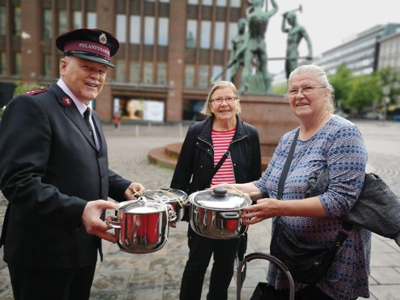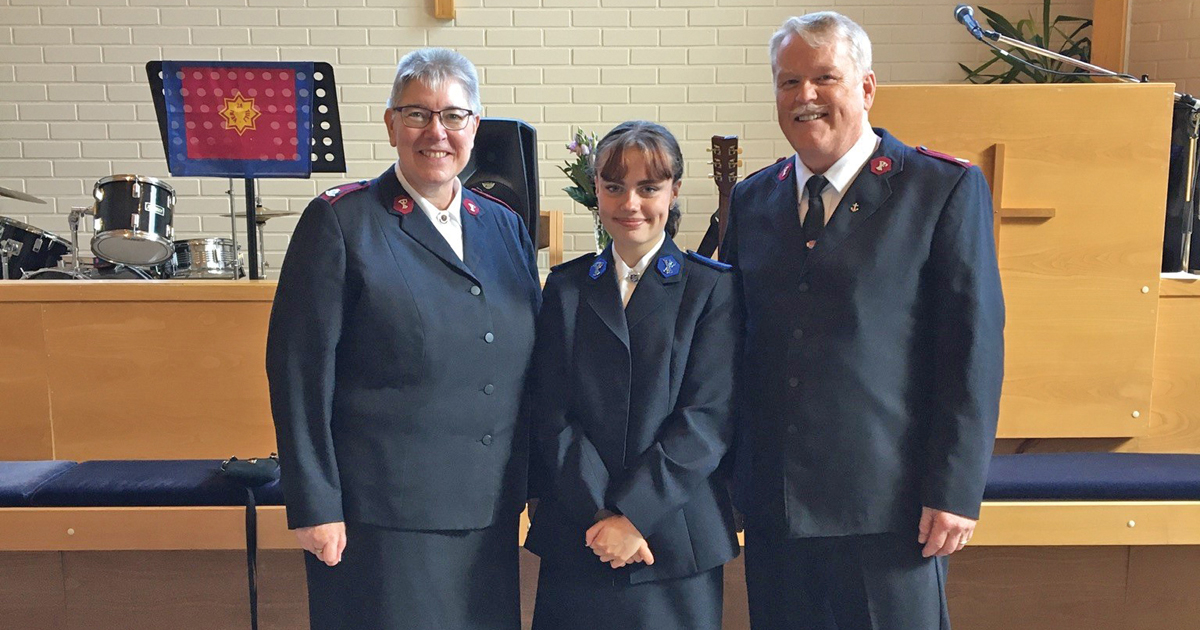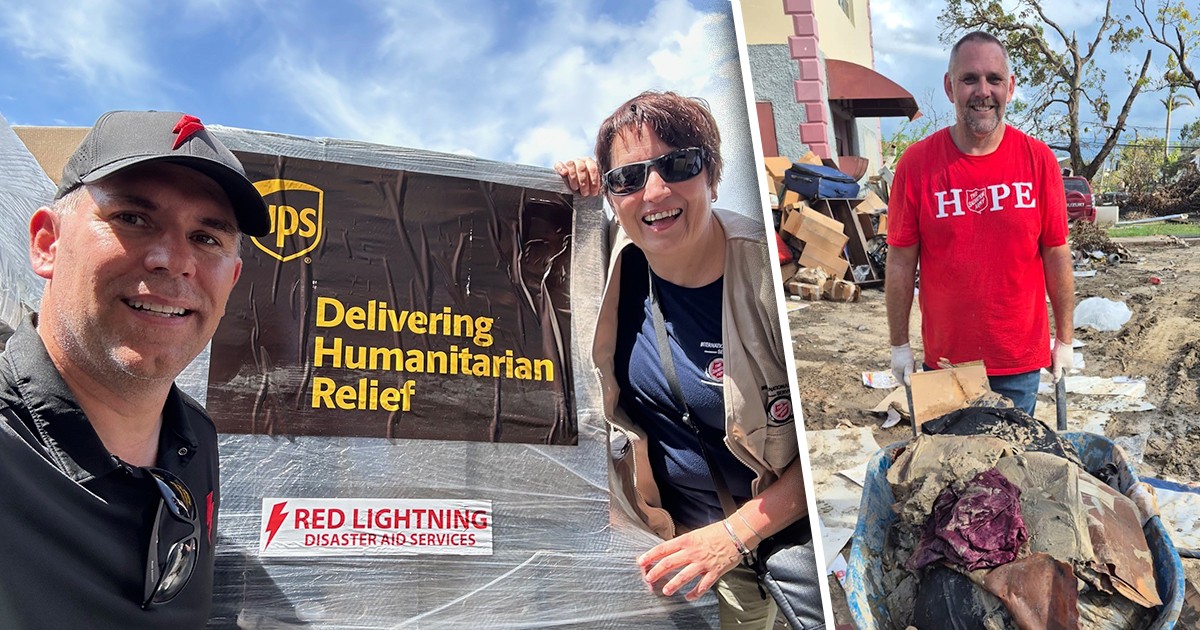Tell us about your journey to officership and international service.
Major Gerry Lindholm: We both grew up in northern Ontario. My family has a farm just north of Englehart, and Hannu lived outside Kirkland Lake. After we got married, I was a social worker for 10 years, and then went back to school and became a teacher. I taught elementary school for 13 years before becoming an officer.
Major Hannu Lindholm: I joined the Canadian Armed Forces at 18. After 10 years in the infantry, I became an electrical engineer and master builder, and spent the last 12 years of my military career building around the world. When I retired, we moved to Glencairn, Ont., near Barrie, and attended The Salvation Army’s Hope Acres. My father taught me to build log homes. I built our dream home and eventually started a log-home building business. Then the Lord called us into ministry, and now we’re building the kingdom for him.
GL: We celebrated our 25th wedding anniversary at training college in Newfoundland and Labrador. While we were there, Hannu listed Finnish on an application as one of the languages he speaks. We had just begun our third year of ministry when we received a call from our divisional commander, who asked, “Have you ever thought about serving in Finland? It’s number one on the list of territories who need officers.” We prayed about it and even though Hannu’s Finnish was rusty—his family immigrated to Canada when he was two—he was happy to go. I thought, Well, I can learn! We arrived in Finland in August 2008.
What were some of the biggest adjustments you had to make?
GL: Finland has a similar culture and values to Canada—family, sports, the arts—so it made it quite easy.
HL: The geography is also quite similar, especially to Ontario, with lots of lakes and forests and four seasons.
GL: It’s a very quiet, independent culture. They express their national character with the word sisu—which I interpret as being internal fortitude, the idea that they are strong and can get through anything.
HL: They also care for their people with an excellent social system. Taxes are high, but people understand their taxes are paying for things like education, which is free. Finland is noted to have the best education system in the world.
GL: As for adjustments, it took a while for me to learn enough Finnish to work independently of Hannu. It was about two years before I took a train trip on my own and felt I could cope. During my first sermon, I stuck to my notes, because my conversational Finnish is not as strong as I’d like it to be. I spoke passionately for God to give us his peace. But instead of peace, I said, “Lord, give us all your money.”
HL: Peace is rauhaa and money is raha.
 Mjr Hannu Lindholm receives a donation of cooking pots. “This long-standing tradition is very popular in Finland,” he says. “Every year, usually in early fall, we get hundreds of cooking pots, which will be recycled into traditional Christmas kettles at the Salvation Army men’s shelter workshop in Helsinki”
Mjr Hannu Lindholm receives a donation of cooking pots. “This long-standing tradition is very popular in Finland,” he says. “Every year, usually in early fall, we get hundreds of cooking pots, which will be recycled into traditional Christmas kettles at the Salvation Army men’s shelter workshop in Helsinki”
HL: Our first appointment was as corps officers in Rauma, a town on the west coast. We were surprised to find out that The Salvation Army wasn’t a church here.
GL: Not an official registered church. Even though people worshipped at the Army, the majority of the members belonged to the Finnish Lutheran Church.
HL: After 18 months in Rauma, we were sent to Kajaani, in the central north, as corps officers.
GL: During the time we were in Kajaani, I was asked to teach a course at the training college in Helsinki. In 2011, we received an appointment to the Helsinki Corps, and I split my time between the corps and the college. Eventually, I became full-time at the college as education officer. Hannu was appointed to Porvoo, just outside Helsinki, so I commuted back and forth.
Then my sister was diagnosed with ALS. I felt strongly that the Lord was asking me to care for her, and The Salvation Army graciously gave us leave to return to Canada. We arrived home on July 25, and my sister died on November 25.
After three years in Canada, we came back to Finland in 2019. Like many countries, Finland is struggling for officers, so every officer wears many hats—that’s a huge challenge. For instance, I’m the training principal, section head for training and education, I serve on eight territorial boards, two of which I chair, I’m on the pastoral care committee for the territory and I’m also leading a pilot leadership project as part of my doctor of ministry in leadership at Tyndale University.
What do you enjoy about working with cadets?
GL: How can you not enjoy working with people who have felt called to give their whole lives to the service of God through ministry? I love the fact that God calls people individually, so they have different gifts and talents. I love being part of that whole formation. I get as much out of it as they get from me, that’s for sure. I thought God was calling me out of teaching into full-time ministry, but teaching is my gift and I have found myself using it in ministry. My part of kingdom building is to invest in future leaders, and so that is a joy.
HL: Seeing Gerry use her gifts has been a tremendous blessing. I’m currently serving as the territorial corps property secretary, which draws on my skills as an engineer as I travel throughout the territory, supporting officers with their buildings. It’s always heart-breaking to close a corps building when we don’t have enough workers, knowing the Army provides spiritual and social care in these communities. A challenge for me is that I miss corps ministry, but everywhere I go I get to preach. My corps is the whole country, the whole territory. Recently, I have received an additional responsibility as an associate corps officer at the Helsinki Temple, which is a traditional Swedish-speaking corps.
How has the Army responded to the pandemic?
HL: In early March 2020, when we started to feel the impact of COVID-19, it was difficult to find people to work on the front line. I received a call and said, “Of course I’ll go.” We stayed for four weeks straight. I could see God working there.
I’ve been helping at The Salvation Army’s social-assistance centre here in Helsinki, where we’ve had hundreds of people standing in line on the street for food. I’m also providing spiritual support, praying with people. I’ve become the food bank pastor.
What has been the highlight of your international service?
GL: For me, the highlight is seeing how God has worked through my weakness. My strength has always been communication—my ability to speak, read, write. Those things were part of what defined me, and when I arrived in Finland I could not communicate. I couldn’t speak the language, I couldn’t read the language, I couldn’t write the language. I was very dependent on Hannu. I questioned why I was here— what could God do with me when I couldn’t communicate? And yet he showed me time and time again that if I was willing, he would use me. I have seen God work in ways I never would have seen had I not been here.










Comment
On Monday, April 26, 2021, A/Capt. Mika Roinila said:
On Sunday, February 21, 2021, Jean moulton said:
Leave a Comment